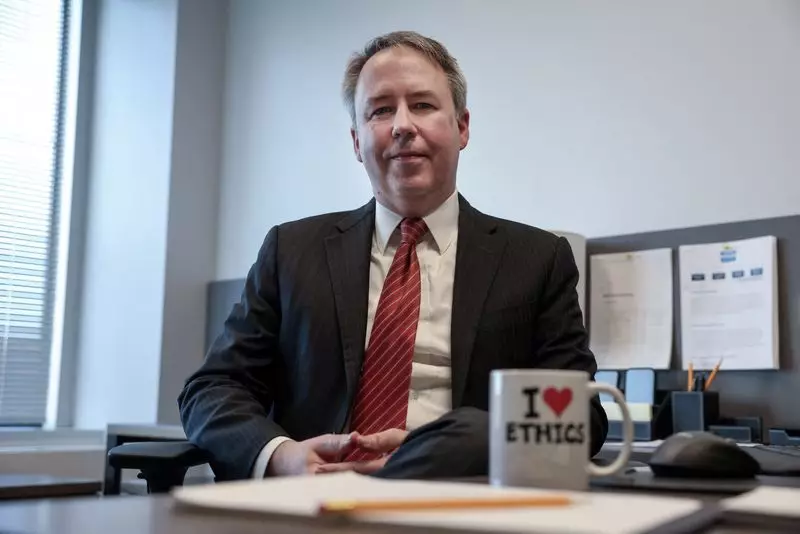In the intricate world of politics, the importance of preventing conflicts of interest among government officials cannot be overstated. As new administrations take the helm, the scrutiny of financial assets and potential conflicts becomes more pronounced. This situation has emerged as a primary focus for David Huitema, the director of the Office of Government Ethics (OGE), who aims to uphold integrity amid a complex web of business ties involving prominent figures like President-elect Donald Trump and his Cabinet. The challenge lies not just in verifying financial disclosures but in navigating the ever-shifting political landscape that activates skepticism and distrust.
Founded to foster transparency and accountability, the OGE’s objective is straightforward: ensure that federal employees prioritize national interests over personal gains. With only 75 employees, the OGE operates in tandem with over 4,000 ethics officials throughout the federal landscape, making it a small but influential component of the ethical governance framework. Huitema’s role is pivotal in scrutinizing the incoming Senate-vetted appointees and ensuring comprehensive financial disclosures, a process that carries significant implications for the integrity of the public sector.
Specifically, financial disclosures are critical as they help identify potential conflicts before nominees assume their positions. The expectation is that this transparency enables Congress to vet nominees thoroughly and equips them to understand any risks associated with their roles. The goal, as Huitema indicates, is to support incoming officials as well as the Senate in facilitating a seamless transition while ensuring ethical compliance.
Every transition in power brings with it a certain degree of volatility, but Huitema’s tenure is marked by unprecedented challenges. Past experiences, particularly under Trump’s first term with Walter Shaub at the helm, highlight the potential for controversy. Shaub’s departure underscored the tension between the OGE’s mission and the unpredictable nature of political priorities, particularly when nominees express hesitation toward the agencies they are tasked with leading.
Huitema’s optimism regarding the intentions of incoming officials contrasts sharply with the skepticism that some ethics experts harbor, notably given the political climate. Watching carefully how Trump’s business ties influence policy should pose significant challenges. This time around, Huitema is equipped with a wealth of experience from his previous role as the ethics chief at the State Department, but the stakes are higher, and public sentiment is more divided than ever.
Huitema has outlined critical operational procedures, including the notification system for financial disclosures. Nominees are expected to submit their disclosures within five days of their nomination, providing transparency that is essential for public and legislative scrutiny. This fast-paced process reveals the centrality of timeliness in maintaining ethical standards and ensuring future officials are prime candidates for accountability.
The enforcement of ethical guidelines, while primarily advisory, carries significant legal ramifications. Should conflicts of interest arise, they can have severe consequences, as the conflict of interest law is criminal in nature. The OGE does not prosecute directly, yet it plays a foundational role in advising employees to mitigate potential breaches that could lead to prosecution by the Department of Justice. Thus, Huitema’s team finds itself in a balancing act of compliance, guidance, and accountability.
As Huitema has pointed out, one of his primary goals is to combat the growing cynicism in public service. He believes in fostering an environment where ethics are not merely an afterthought but are integrated into the decision-making processes of public servants. This requires ongoing ethics training that is often lacking, particularly for those transitioning from the private sector, where the pursuit of personal gain can overshadow public duty.
The stark difference in expectations between sectors can lead to misunderstandings and misalignments in behavior. Therefore, part of Huitema’s mission will involve adapting the culture of ethics training to address these differences effectively. His work aims not only to educate but also to build a framework where ethical conduct is celebrated and understood as essential for robust democratic governance.
As David Huitema gears up for the rigors of his role ahead of the upcoming presidential inauguration, the landscape of government ethics remains tumultuous. The ultimate measure of his success may depend not solely on the adherence to policy but also on restoring public trust in the ethical framework of governance. Given the scrutiny that accompanies each new appointment, the challenge ahead involves not just adhering to guidelines but fostering an ethos of accountability that transcends partisan lines. Navigating these waters will require not only vigilance but a commitment to the principles that underpin effective and ethical governance.

